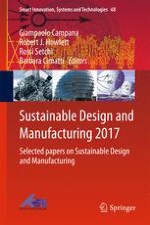2017 | OriginalPaper | Chapter
A Multi-Criteria Decision-Making Model to Evaluate Sustainable Product Designs Based on the Principles of Design for Sustainability and Fuzzy Analytic Hierarchy Process
Authors : Chanjief Chandrakumar, Asela K. Kulatunga, Senthan Mathavan
Published in: Sustainable Design and Manufacturing 2017
Publisher: Springer International Publishing
Activate our intelligent search to find suitable subject content or patents.
Select sections of text to find matching patents with Artificial Intelligence. powered by
Select sections of text to find additional relevant content using AI-assisted search. powered by
